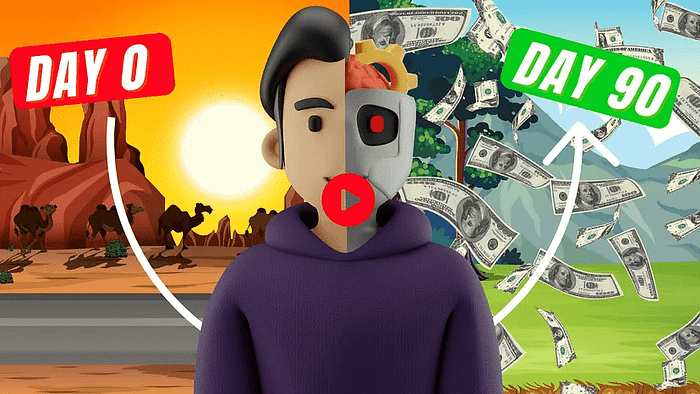Facebook is Dying: The Great Publisher Renaissance of 2024
Social media’s original titan is crumbling – Facebook is dying, but this decline signals an unprecedented gold rush for savvy publishers. The once-mighty platform’s transformation from a friend-focused social network to a content consumption machine has created a fascinating paradox: while user engagement dwindles, publisher revenues soar to new heights.
We strongly recommend that you check out our guide on how to take advantage of AI in today’s passive income economy.
Table of Contents
The Undeniable Signs of Facebook’s Decline
The writing appears boldly on the virtual wall as Facebook is dying in plain sight. My recent scroll through the platform revealed an alarming truth about the state of content quality. Instead of meaningful updates from friends and family, my feed has morphed into an endless stream of mindless content, carefully orchestrated by Facebook’s evolving algorithm. This dramatic shift represents more than just a change in content strategy – it’s a desperate attempt to maintain relevance in a rapidly changing social media landscape.
The platform’s reporting techniques have become increasingly opaque, raising red flags about Facebook’s true health. While quarterly reports show a superficial increase in daily active users through Q3 2023, Meta has conspicuously shifted to reporting combined user metrics across all its platforms. This strategic move suggests Facebook is dying faster than they’re willing to admit, masking individual platform performance behind collective numbers that include Instagram, WhatsApp, and other Meta properties.
The Content Apocalypse
The most telling sign that Facebook is dying manifests in the quality and source of content flooding user feeds. During a recent analysis of my personal feed, the results were staggering. Only about 30% of posts came from actual friends or followed pages. The remaining 70% consisted of suggested content, sponsored posts, and random pages I’d never expressed interest in following. This algorithmic force-feeding of content speaks volumes about Facebook’s desperate need to fill the growing void left by declining user engagement.
The Great Content Vacuum
As Facebook is dying, a fascinating phenomenon emerges. The platform faces a critical shortage of authentic user-generated content. Long-time users have notably reduced their posting frequency, creating a content vacuum that Facebook scrambles to fill. This shift represents a fundamental change in social media dynamics, where platforms increasingly rely on professional content creators rather than organic user interactions.
The Demographics Dilemma
The youth exodus represents another clear indicator that Facebook is dying. Generation Z and younger millennials view Facebook as a platform for “older people,” preferring more dynamic and authentic platforms like TikTok and Instagram. This demographic crisis creates a snowball effect – as younger users abandon ship, the platform becomes less attractive to advertisers targeting these valuable audience segments.
The Publisher’s Golden Opportunity
While Facebook is dying as a traditional social network, it’s simultaneously giving birth to a new ecosystem of opportunity for publishers. The platform’s desperate need for engaging content has created an unprecedented opportunity for content creators and publishers to fill the void. This transition marks a historic moment in digital publishing, where small publishers can potentially reach massive audiences with relatively little competition from organic user content.
The Algorithm’s New Direction
Facebook’s algorithm has undergone a dramatic transformation as Facebook is dying. Instead of prioritizing friends’ updates, it now heavily favors content that drives engagement, regardless of its source. This shift represents a golden opportunity for publishers who can create compelling content that resonates with Facebook’s massive, yet increasingly content-hungry user base.
Monetization in the New Era
As Facebook is dying, the platform has introduced lucrative monetization opportunities for publishers. The Facebook Performance Bonus Program represents just one example of how the platform is willing to pay handsomely for quality content that keeps users engaged. Publishers regularly earn thousands of dollars monthly through strategic content creation and distribution.
Success Strategies for Publishers
In this era where Facebook is dying, publishers need to adapt their strategies to maximize opportunities. This includes understanding Facebook’s content preferences, optimal posting schedules, and engagement metrics. Success in this new landscape requires a delicate balance between creating engaging content while avoiding the “brain rot” content that has become prevalent on the platform.
The Future Landscape
While Facebook is dying in its traditional form, the platform’s evolution presents unprecedented opportunities for digital publishers. The transition from a friend-focused social network to a content discovery platform mirrors successful models seen across other social media platforms. This transformation, while concerning for traditional users, opens new doors for content creators and publishers.
Sustainability and Growth
As Facebook is dying, questions arise about the sustainability of this new publishing ecosystem. However, current trends suggest that as long as Facebook maintains its massive user base – even if primarily for content consumption rather than social interaction – publishers will continue to find profitable opportunities on the platform.
Conclusion
The reality that Facebook is dying presents a fascinating dichotomy – while the platform’s original social networking purpose fades, a new golden age of digital publishing emerges. This transformation offers unprecedented opportunities for publishers who can adapt to and capitalize on these changes. As we witness this historic shift in social media dynamics, one thing becomes clear: the death of Facebook’s original vision has given birth to a new era of digital content creation and monetization.
For publishers willing to invest time and resources into understanding and leveraging Facebook’s new direction, the opportunities are boundless. The platform’s decline as a social network has created a vacuum that savvy publishers can fill with quality content, establishing sustainable revenue streams in the process. As Facebook continues its transformation, those who adapt quickly will find themselves at the forefront of this digital publishing renaissance.

We strongly recommend that you check out our guide on how to take advantage of AI in today’s passive income economy.




